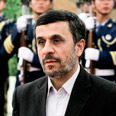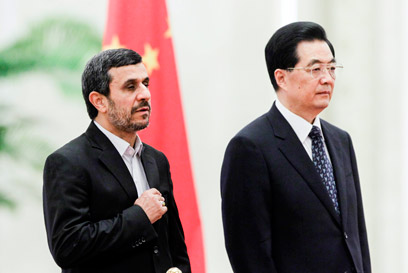
China urges Iran to show flexibility on nukes
Amid new round of talks with IAEA, Chinese President Hu Jintao urges Iran's Ahmadinejad to be more flexible over nuclear program
Chinese President Hu Jintao urged Iranian counterpart Mahmoud Ahmadinejad to show flexibility and pragmatism in new rounds of international talks over its nuclear ambitions.
Jintao's nudging remarks Friday indicate of Beijing's desire to be seen as a constructive force on the issue. China and Russia have been criticized at times for maintaining warm ties with Tehran and opposing stiffer sanctions to compel it to shut down its highest-level uranium enrichment and meet other demands.
Related stories:
- Russia warns US on Iran sanctions Putin: Russia supports 'peaceful' nuclear drive in Iran Op-ed: Iran on verge of disaster
Hu also told Ahmadinejad that Iran should work more closely with the International Atomic Energy Agency (IAEA) to resolve the issue through dialogue and negotiations.
Meanwhile, the UN nuclear watchdog and Iran began a new round of talks on Friday in an attempt to seal a framework deal to resume a long-stalled probe into nuclear research in the Islamic state.

Jintao and Ahmadinejad (Photo: EPA)
World powers will be watching the IAEA-Iran meeting in Vienna closely to judge whether Tehran is ready to make concessions before its broader talks with them later this month in Moscow on their decade-old nuclear dispute.
The International Atomic Energy Agency will press Iran for an agreement that would give its inspectors immediate access to the Parchin military complex, where it believes explosives tests relevant for the development of nuclear bombs have taken place.
'Fabricated allegations'
Iran has said it will work with the UN agency to prove that such allegations are "forged and fabricated".
Ali Asghar Soltanieh, Iran's envoy to IAEA, smiled but declined to comment to reporters as he entered the IAEA's headquarters in Vienna for his meeting with senior agency officials.
Both Iran and the IAEA say significant progress has been made on the so-called "structured approach" document that would set the overall terms for the IAEA's investigation.
But differences remain on how the IAEA should conduct its probe, and the United States said this week it doubted whether Iran would give the UN agency the kind of access to sites, documents and officials it needs.
"I'm not optimistic," Robert Wood, the acting US envoy to the IAEA, told reporters on the sidelines of a meeting of the UN agency's governing board. "I certainly hope that an agreement will be reached but I'm not certain Iran is ready."
His skepticism was reinforced by defiant remarks by Soltanieh, who accused the UN body on Wednesday of acting like a Western-manipulated spy service and said that Iran's military activities were none of its business.
The Iranian envoy said Iran would "not permit our national security to be jeopardized", suggesting it might limit the scope of the UN inspectors' investigation.
A European diplomat said Soltanieh's remarks signaled that Iran would be in no mood to compromise in Friday's Vienna talks.
Western officials, who suspect Iran is dragging out the two sets of talks to buy time for its nuclear program, say the value of any deal will depend on how it is implemented.
- Receive Ynetnews updates directly to your desktop










